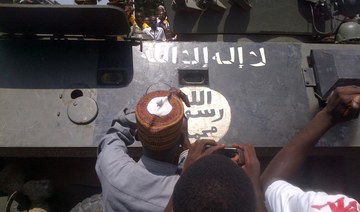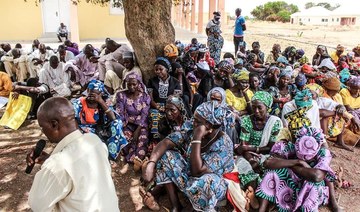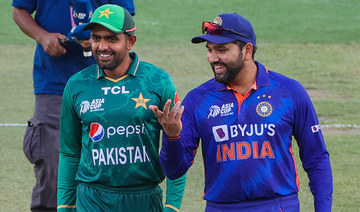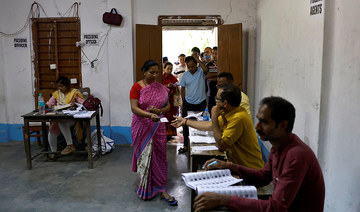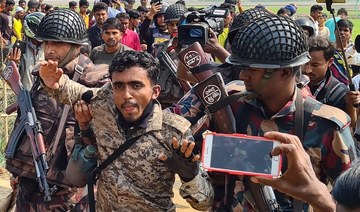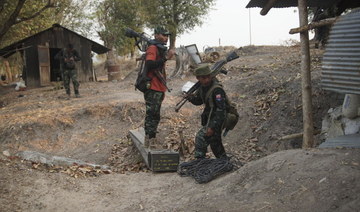MAIDUGURI, Nigeria: Maiduguri resident Ahmed Muhammed wanders through the rubble left behind as he recalls the outbreak of fighting in his city a decade ago that launched the Boko Haram insurgency in Nigeria.
“We heard shooting — badadadadadada — here, there, everywhere around us,” the 44-year-old railway worker told AFP.
“We thought the end of the universe had come.”
In late July 2009, tensions between the hard-line Islamist sect and authorities in northeast Nigeria boiled over as the group launched a wave of attacks and security forces fought back ruthlessly.
The epicenter of the violence was the compound of the group’s founder Muhammad Yusuf.
After several days of fighting, Yusuf and hundreds of Boko Haram members were dead and a conflict had been unleashed that would devastate the region.
The mosque and the homes that once stood there are now just a pile of debris — an unmarked monument to the suffering of the past 10 years.
In the decade since the uprising began, some two million people have been uprooted from their homes and 27,000 killed as the bloodshed has spilt into neighboring countries.
Boko Haram has turned vast swathes of territory into a no man’s land and forced its way into international headlines by abducting hundreds of schoolgirls.
While the Nigerian army has pushed the fighters from major towns, the jihadists have splintered into factions and spawned an offshoot aligned to the Daesh group that has unleashed its own campaign of violence.
Waves of the conflict crashed over Hadiza Bukar’s village near Baga close to the shores of Lake Chad in 2015 when Boko Haram fighters stormed through the area.
Bukar fled with her newborn twin sons, leaving behind her husband and two other children.
She has not heard from them since.
What remains of the family is now among the roughly quarter-of-a-million people displaced and struggling to survive in and around Maiduguri, capital of Borno State.
Studded across the city are government-approved camps and informal settlements of corrugated iron, sticks and shreds of tarpaulin.
The only place Bukar found to live is at the ground zero of the insurgency that tore her life apart. Her makeshift home stands on the edge of the ruins of Yusuf’s former compound.
When the downpours come in the rainy season the place turns into a quagmire.
“Many people told us stories about what happened here. They warned us there was a history,” she said, of the bloodshed in 2009. “But we had no option. We have nowhere to go. We decided to stay.”
Across town in another district Idrissa Isah, 45, scrapes by as best he can.
Isah used to send cows to Nigeria’s economic hub Lagos, but now all he has is a small patch of earth near his shack that a local landowner lets him till.
The little he grows helps supplement sporadic handouts from international aid groups and feed his family. He says he has had no government support.
Isah is desperate to return to his village of Makulbe about 30 kilometers (20 miles) from Maiduguri, but the risk is too high.
“If I could go back I would — I would have a big, big farm,” he said.
“There is no way I can.”
Finding a way home for the displaced is seen as key to solving the humanitarian crisis in northeast Nigeria.
After forcing the extremists back to remote hideouts, the government insists the security situation is stabilising.
But attacks persist outside heavily fortified towns.
Over just a few days in July, five soldiers were killed and six aid workers kidnapped.
On Thursday, a Boko Haram raid killed at least two people in a displaced camp near Maiduguri.
So far this year, 130,000 people have been displaced in northeast Nigeria, the International Organization for Migration says.
Ibrahim Bukar, 48, is comparatively lucky.
The local government accountant still receives his official salary of about $80 (75 euros) a month even though he has not worked in his hometown Bama, 65 km from Maiduguri, since it was devastated by fighting more than four years ago.
But the wage does not cover rent and he squats with his wife and four children in the one-room servants’ quarters of an acquaintance’s house.
Last October, after more than four years away, he decided to go home.
“There was nothing,” he said.
“No food, no potable water, no health services, no teachers — don’t even talk of electricity.”
Beyond the town, he said, you cannot travel safely for more than a kilometer. After three months, Bukar gave up and headed back to Maiduguri.
The displaced camps are still filling up.
A sprawling site around the city’s main stadium opened in March and has already reached its capacity with over 12,000 people.
Fatima Mohammed, 38, moved into a tarpaulin shelter three weeks ago with her husband and two children.
She arrived from an overcrowded camp not far away, having been displaced several times since being forced from her village five years ago.
She has no idea if, or when, she will see home again.
“All depends on god — if there is peace I will go back immediately,” she said.
“But if there is no peace then there is no way I can return.”
10 years into extremist rebellion, no reprieve for Nigeria’s displaced
10 years into extremist rebellion, no reprieve for Nigeria’s displaced
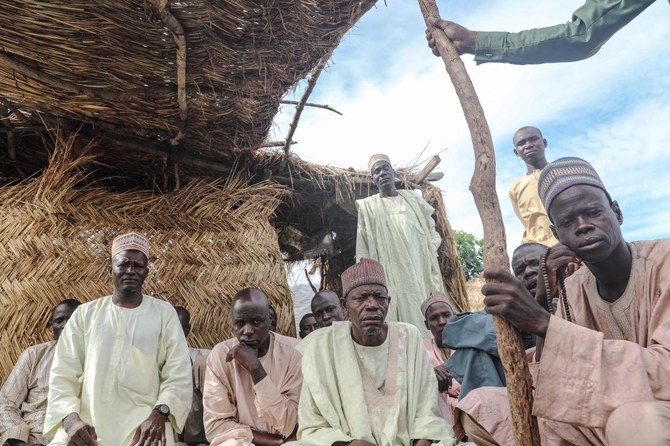
- In late July 2009, tensions between the hard-line Islamist sect and authorities in northeast Nigeria boiled over
- The mosque and the homes that once stood there are now just a pile of debris — an unmarked monument to the suffering of the past 10 years
Polish flag carrier LOT cancels Friday flights to Tel Aviv and Beirut, PAP reports

- Decisions about future flights would be made on an ongoing basis
WARSAW: Polish national airline LOT canceled flights on Friday to Tel Aviv and Beirut due to the unstable situation in the region, a spokesperson was quoted as saying by state news agency PAP.
“Today’s flight 151/152 to Israel from Warsaw and to Beirut 143/144 have been canceled,” Krzysztof Moczulski told PAP. He said decisions about future flights would be made on an ongoing basis.
French police arrest man who threatened to blow himself up at Iran’s Paris consulate

PARIS: A man who had threatened to blow himself up at Iran’s consulate in Paris was arrested by police, a police source said.
French police earlier cordoned off the Iranian consulate, Reuters reporters saw.
A police source told Reuters the man was seen at about 11 am (0900 GMT) entering the consulate, carrying what appeared to be a grenade and explosive vest.
Police earlier said they were at the scene and asked the public to avoid the area but provided no further details.
Service was interrupted on a nearby metro line for security reasons, the RATP metro company said.
A person at the Iranian embassy who responded to a call from Reuters declined to provide any information on the situation.
It was unclear whether the incident had any link to the escalating tensions between Iran and Israel.
Earlier on Friday, explosions echoed over the Iranian city of Isfahan in what sources described as an Israeli attack, but Tehran played down the incident and indicated it had no plans for retaliation — a response that appeared gauged toward averting region-wide war.
Blinken says US ‘not involved in any offensive operation’

- ‘All I can say is for our part and for all the members of the G7 our focus is on de-escalation’
CAPRI, Italy: US Secretary of State Antony Blinken on Friday refused to comment on reports of an attack by Israel on Iran, beyond saying Washington was “not involved in any offensive operation.”
Speaking to journalists after a meeting with G7 counterparts in Italy, he declined to answer repeated questions about explosions in Iran, and reports that Israel had carried out retaliatory strikes.
“I’m not going to speak to these reported events... All I can say is for our part and for all the members of the G7 our focus is on de-escalation,” Blinken told a press conference on the island of Capri.
“The US has not been involved in any offensive operation,” he said.
Speaking to reporters earlier, G7 host Antonio Tajani, the foreign minister of Italy, said Washington had been informed in advance of the strikes, without giving details.
“The United States were informed at the last moment,” he said, adding that “it was just information” passed on — without saying who by.
The reports dominated the G7 Friday, with Tajani forced to change the agenda, but little public information emerged.
In its final statement, the Group of Seven ministers said: “In light of reports of strikes on April 19th, we urge all parties to work to prevent further escalation. The G7 will continue to work to this end.”
Israel had warned it would hit back after Iran fired hundreds of missiles and drones at Israel almost a week ago, in retaliation for a deadly strike — which Tehran blamed on its foe — that levelled Iran’s consular annex at its embassy in Syria.
Indians head to the polls in world’s biggest election
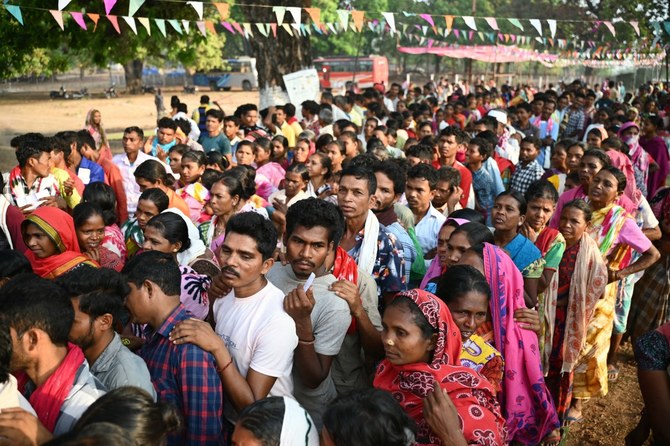
- Polling takes place in phases over the next six weeks, with results expected on June 4
- Over 968 million people are registered to vote, with 168.6 million casting ballots on Friday
NEW DELHI: Indian voters headed to the polls on Friday for the first phase of the world’s biggest general election, in which Prime Minister Narendra Modi is aiming for a rare third consecutive term.
More than 968 million people are registered to vote, with polling taking place over the next six weeks, as results are expected on June 4.
After April 19, the other voting dates will be April 26, May 7, May 13, May 20, May 25 and June 1, with some states completing the process on a single day, and others having it spread out in several phases.
Friday’s polling was held in 21 states and union territories, including the most populous ones such as Uttar Pradesh, Bihar, Rajasthan, Tamil Nadu, and Maharashtra, as well as smaller northeastern states and the northern Himalayan territory of Jammu and Kashmir.
In Kashmir, this is the first election since its special autonomous status and statehood were scrapped through the Indian government’s controversial constitutional amendment in 2019.
Chief Election Commissioner of India Rajiv Kumar told reporters on Friday that 168.6 million people were expected to cast their ballots on Friday.
“The preparations started, actually, two years back. Wide range of preparations … It’s a tremendous exercise,” he said.
MAIN CONTENDERS
More than 2,600 political parties are registered in the marathon election and 543 contested seats in the lower house of Parliament. The party or coalition that wins at least 272 is going to form the government.
Modi is targeting 400 seats for the National Democratic Alliance led by his Hindu nationalist Bharatiya Janata Party, which has been in power since 2014.
He is challenged by an alliance of two dozen opposition parties — the Indian National Developmental Inclusive Alliance, or INDIA, led by the Congress Party, which has ruled the country for close to 45 years since its independence in 1947.
The key leader of the opposition coalition is Rahul Gandhi — the son of Rajiv Gandhi, a grandson of Indira Gandhi, and a great-grandson of Jawaharlal Nehru, all of whom served as prime ministers of India.
While the opposition is trying to appeal to Indian youth with promises to tackle unemployment, free education and medical facilities, the BJP has deployed the same tactics as in previous polls — by mobilizing voters through majoritarian Hindu sentiment, despite constitutional provisions that make it a secular state.
Opinion polls show Modi as frontrunner, with 48 percent of respondents in the most recent survey released by the Centre for the Study of Developing Societies last week naming him as their choice for the prime minister. Gandhi was second, preferred by 27 percent.
“Modi has created an image of a powerful leader, a leader who is not only popular in India but outside too. He has also created an image of not pandering to Muslim communities in India … This image of a leader who does not appease the Muslim sentiments appeals to the Hindu masses. Politics of polarization helps Modi to build an image and aura among a large section of the Hindu voters,” Prof. Venkat Narayan, political analyst and commentator, told Arab News.
“Then the use of social media and the mainstream media is also there to create an image and broaden Modi’s appeal. The media plays a great role in creating this image, they are soft towards Modi and do not ask critical questions.”
If Modi wins the election, he will become the second prime minister, after Nehru, to succeed in three consecutive polls.
“Modi is leading in the polls as he has created an image of doing a lot for different sections of the society. Besides, he projects himself as squeaky clean. People also think that as he has no children, he has no reason to be corrupt or be on the take,” Sanjay Kapoor, analyst and editor of the English-language political magazine Hardnews, told Arab News.
“There are other reasons for his popularity, which include adroit use of media and social media that control all criticism against him. Then there are issues of raising India’s global profile and pursuing an independent foreign policy.”
FUTURE FOREIGN POLICY
Whoever wins the election, the foreign policy direction is likely to remain broadly unchanged, except for India’s orientation toward Israel and Palestine.
Support for Palestine and Palestinian statehood was once an integral part of India’s foreign policy, but in recent years, under Modi’s rule, New Delhi has become closer to Tel Aviv, despite civil society protests breaking out across the country against Israel’s deadly war on Gaza.
“If the INDIA alliance comes to power, then we may see a change in our policy towards Israel and Palestine. The INDIA alliance is sympathetic to Palestinians,” Kapoor said.
“We expect that the INDIA alliance will also restore ties with neighbors like Pakistan, (and) revive SAARC (South Asian Association for Regional Cooperation).”
The member states of SAARC — a regional intergovernmental organization and geopolitical union of states in South Asia — are Afghanistan, Bangladesh, Bhutan, India, Maldives, Nepal, Pakistan, and Sri Lanka.
The last biennial SAARC summit was hosted by Nepal in 2014. Pakistan was to host the summit in 2016, but it was stalled after India refused to participate, following an attack on an Indian army camp in Kashmir that New Delhi blamed on Pakistan-based militants.
VOTERS’ CONCERNS
According to the Centre for the Study of Developing Societies survey, unemployment emerged as the top concern for 27 percent of respondents.
Some 62 percent also said it has been more difficult to find a job in the last five years — during Modi’s second term in office.
“The biggest concern remains inflation and unemployment. The possibility of getting a job decreases if you study more. People are forced to leave India in search of jobs. Some have even gone as far as Russia and Israel,” Kapoor said. “The situation is really dismal.”
Rising prices and inflation were also a major issue — the top concern for 23 percent of the people surveyed by the CSDS.
“Women and the middle class are concerned about the rising prices. Modi is trying to divert attention from these main issues by talking about religion and temples,” said Shashi Shekhar Singh, associate professor at Satyawati College at the University of Delhi.
The CSDS pre-poll also revealed that despite the ruling party’s narrative promoting Hindu nationalist dominance to establish a majoritarian state in India, only 11 percent of respondents saw India as solely for Hindus.
But there were fears the reality on the ground could change if the BJP tried to amend India’s liberal and democratic constitution.
“Indian secularism and the very idea of a plural democracy is at stake,” Singh said.
“There is a fear that if the BJP comes to power with the thumping majority, the liberal and secular democracy will breathe its last. The BJP might lead the nation further down the path of a Hindu majoritarian state.”
ASEAN says ‘deeply concerned’ over escalating Myanmar violence
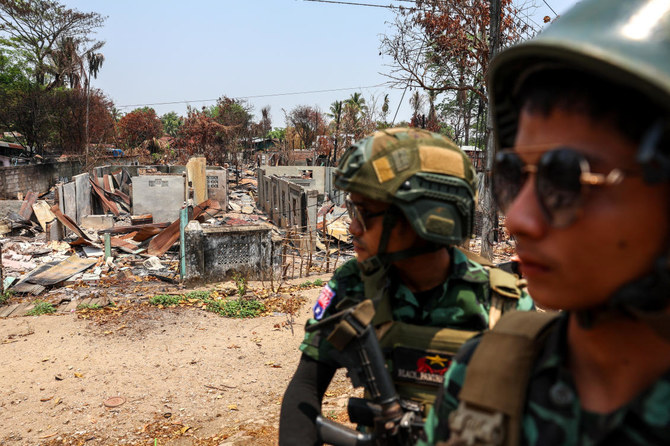
- ASEAN foreign ministers urge ‘all parties for an immediate cessation of violence’ in Myanmar
BANGKOK: Regional bloc ASEAN said it is “deeply concerned” about a recent upsurge in fighting in Myanmar, after fierce clashes over a key trading hub near the Thai border.
The foreign ministers of the Association of Southeast Asian Nations urged “all parties for an immediate cessation of violence” in Myanmar, which has been roiled by conflict since the military seized power in a February 2021 coup.
The ministers’ statement issued late Thursday said ASEAN was “deeply concerned over the recent escalation of conflicts, including in the area of Myawaddy.”
The military was last week forced to pull its troops out of positions in the valuable trading post after days of battling with the Karen National Union (KNU) — a long-established ethnic minority armed group — and other anti-junta fighters.
It was the latest blow suffered by the junta, which has suffered a string of battlefield losses in recent months, with some analysts warning it is its most significant threat to date.
Myawaddy is Myanmar’s main trade link to Thailand, and usually sees over a billion dollars worth of trade annually.
The clashes saw people flee across the border into Thailand — from where gunfire and the boom of artillery barrages could be heard.
Thailand has said it is ready to receive people from Myanmar, though the kingdom’s foreign minister warned it would not tolerate any violation of its sovereignty.



